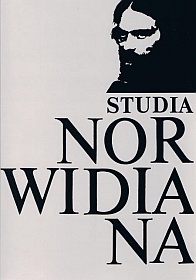Norwid a pozytywistyczna koncepcja dziejów (Henry Thomas Buckle)
Abstrakt
The worldview of Cyprian Norwid developed in conscious opposition towards European Positivism (Scientism). However, his critical stance did not exclude the possibility of a dialogue. Norwid, due to his being an exile and longtime resident of Paris, the nineteenth century capital of European civilization, acquired a broad knowledge of this new intellectual current. He closely watched the development of Positivist science (particularly in the field of history), and he took account of its discoveries. This is borne out by a letter of Norwid with a (possibly distorted) quotation from the first volume of History of Civilization in England. This monumental work had been written by Henry Thomas Buckle, one of the main representatives (together with Hyppolite Taine and Ernest Renan) of the Positivist philosophy of history. More profound analysis shows that a critical reception of Buckle's philosophy of history left its mark on several later texts of Norwid (e.g. the short stories Stigma and The Secret of Lord Singelworth). Norwid's reception of the Positivist philosophy of history seems to be quite original, because he actually adopted some of its tenets and attempted to incorporate them into a context that revealed their roots in the evangelic Salvation History. Thus, Norwid admitted the epistemological relevance of some Positivist ideas about the nature and structure of history.
Copyright (c) 2011 Studia Norwidiana

Utwór dostępny jest na licencji Creative Commons Uznanie autorstwa – Użycie niekomercyjne – Bez utworów zależnych 4.0 Międzynarodowe.





